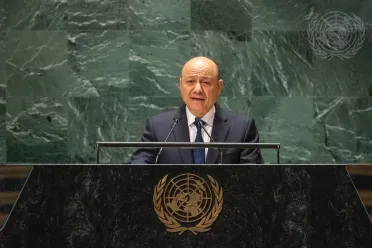Statement
Statement summary
RASHAD MOHAMMED AL-ALIMI, President of the Presidential Leadership Council of Yemen, commending the international community’s unified position on the constitutional legitimacy of his country, acknowledged the solidarity of Saudi Arabia and the United Arab Emirates. “Their positions represented a strong fence to prevent the collapse of institutions,” he underscored. Recalling that his Government had to re-establish the Presidential Leadership Council, he lamented that “peace remained elusive”. “We do not have enough time or compromises to make to convince the Houthi militias to change their positions,” he stressed, pointing out that they use peace agreements to delay matters further and acquire more resources.
Urging the international community to support the legitimate Government, he said that the “superpowers” must send a clear message to the Houthi militias that they should not overturn constitutional legitimacy. To restore trust and achieve progress in the “Yemen dossier”, the track based on international humanitarian intervention should be reconsidered to also combat terrorism, rebellion and armed groups. In this context, he welcomed United Nations efforts to move from relief interventions to sustainable development. Underlining the importance of recognizing Yemen’s Central Bank to strengthen the national currency and ensure that funds don’t fall in the militias’ hands, he pointed out that this track contradicts the international rhetoric, which calls for the improvement of the country’s economic indicators at a time when international operations are going through institutions under the Houthis’ control. They impose arbitrary measures to violate the independence of the banking service, the confidentiality of its operations, turning the sector into a money-laundering network, he added.
He went on to report an increase in threats from Al-Qaida and Da’esh, supported by the militias and Iran with money, weapons and intelligence services, observing: “They also share the same Takfiri ideology.” Recalling that the public budget had been in good shape since the start of the war, he lamented that this “momentum” stopped as a result of the Houthis attacks on oil facilities. Was it not for Saudi Arabia’s grant of $1.2 billion to support the public budget, the Government would have been unable to ensure salaries disbursement. Further, he commended humanitarian and development pledges of the United Arab Emirates, the United States, the European Union, the United Kingdom and other regional partners. However, despite humanitarian intervention, the Houthis have targeted navigation routes in the Red Sea, Bab-el-Mandeb Strait and the Aegean Sea; used them as military areas; tested new weapons; and targeted commercial ships and tankers, he reported.
In this regard, he reaffirmed the need for guaranteeing the freedom of international navigation; combating extremism, terrorism and piracy; and supporting measures to prevent the proliferation of weapons of mass destruction, notably Iran’s nuclear weapons, ballistic missiles and their role in sabotaging the region. Calling on the international community to condemn Teheran’s interventions in Yemen’s affairs, he also urged Member States to commit to an arms embargo and prevent that country from providing the militias with ballistic missiles and drones, used against civilians. Recalling that his Government established an independent national committee to investigate human rights violations, he observed that the agreements, signed by the Houthis with the UN, have not been implemented.
Yemen has made compromises and worked hard to rebuild its country and regain the trust of its people, but the head of the Presidential Leadership Council on Thursday cautioned the international community that “dealing with Houthi militias as de facto authorities” would likely reverse hard-won gains and could turn Yemen into a hotspot to export terrorism worldwide.
Full statement
Read the full statement, in PDF format.
Photo

Previous sessions
Access the statements from previous sessions.
